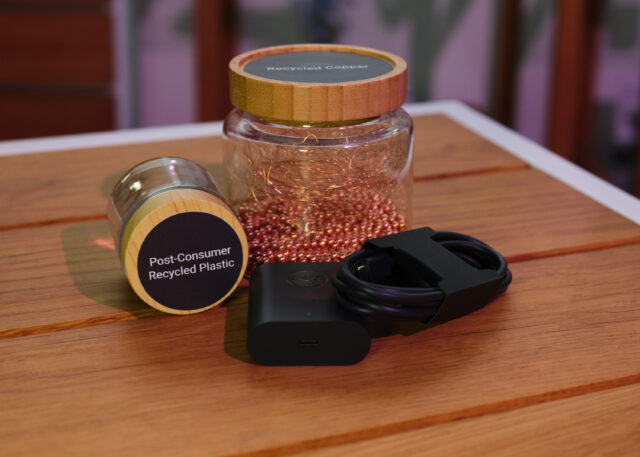We’ve just unveiled major performance and sustainability upgrades to Dell’s AI PC portfolio, setting new benchmarks in circular innovation. We’ve enhanced performance, extended battery life, improved efficiency, and designed for greater durability and easier repairs.
Circular Innovations Realized
First showcased in late 2021, our vision for sustainable PC design, Concept Luna, accelerated the expansion of sustainable technology innovation across our portfolio. These insights have helped to advance modular design, apply intelligent telemetry, and redefine how customers repair, refurbish, and recycle hardware.
This week’s announcements include some of our most exciting circular design updates:
Take, for example, modular design, to help extend product life and reduce waste. Our Dell Pro and select Pro Max notebooks are the world’s first commercial notebooks built with a Modular USB-C Port¹. The ports are up to four times more durable² and easily replaceable, if required. USB-C ports are a frequently used component and typically soldered to the mainboard, which is one of the most emissions-intensive parts to manufacture. Separating these ports from the mainboard and using screws instead of solder allows for easier access without risking damage to critical components.

We have also reimagined batteries, based on customer requests for easier access. We’ve introduced customer-replaceable batteries with simplified cable designs, enhancing control, repairability and longevity. The updated portfolio also offers options such as batteries containing reduced or recycled cobalt, providing a more sustainable option for customers³.
These devices show how sustainable innovations can scale to help reduce customer costs and environmental impact.
Materials and Practices to Reduce Environmental Impact
We’ve also made notable strides in using more recycled or renewable materials in our PCs, displays and accessories. This includes the use of low-emissions aluminum, bio-based plastic, recycled cobalt, recycled steel and recycled copper to name a few. In fact, last year, we used more than 95 million pounds of recycled and renewable materials in our products4
Our packaging reflects a similar commitment. In FY24, 96.4% of our packaging materials were reused, renewable or recycled5, keeping us on track to reach our 2030 goal. Even future accessories like our PC docks and backpacks will ship in 100% recycled or renewable packaging6.
In addition, our latest AI PCs and commercial monitors will meet some of the highest sustainability standards with EPEAT Gold with Climate+ registrations and the new TCO Gen 10 certifications7.
Closing the Loop with Reuse and Recycling
For us, circular design goes beyond keeping materials in use longer. Circular innovation extends to how customers use and retire products. Features like QR codes on our PCs will help customers access support pages.

Additional QR codes on select Alienware PC components will also make it easy for gamers to access instructions for upgrades, repairs or replacements.
Our recovery and recycling services also offer both consumers and business customers reliable, secure solutions to retire IT products while creating opportunities to reuse valuable materials.
Our goal is that by 2030, for every metric ton of technology purchased, we’ll reuse or recycle an equivalent amount. It’s an ambitious target but aligns with our belief in making sustainability a shared mission with our customers.
Circular Innovation in Action
With smart designs, more sustainable materials and efficient tech, we’re showing how big ideas can spark momentum and innovation at scale. Whether it’s using recycled and low-emissions aluminum in our gaming notebooks8 or designing modular components, every decision is part of our effort to help ensure nothing goes to waste. Learn more about how we are accelerating the circular economy.
1 Applies to Dell Pro, Dell Pro Plus and Dell Pro Premium notebooks as well as Dell Pro Max and Dell Pro Max Plus workstations launching in 2025. Based on internal analysis, November 2024. Read warranty information for port replacement instructions.
2 Applies to Dell Pro notebooks. Based on internal comparison of the solder connection on Latitude 7450 vs screwed connection testing data of the Dell Pro Premium laptop subject to a standard repeated axial load and a standard wrenching torque in multiple directions. The new USB-C port design is a screwed-on connection for easier repairs and improved durability. Read warranty information for USB-C port replacement instructions.
3 Applies to Dell Pro and Dell Pro Plus notebooks. Based on internal analysis. Entry battery (45 watt hour) uses NCM technology and has 80% lesser cobalt compared to LCO technology. Upsell battery (55 watt hour) is made with 50% recycled cobalt.
4 FY24 Dell Technologies ESG Report, June 2024
5 FY24 Dell Technologies ESG Report, June 2024
6 Based on internal analysis, July 2024
7 Based on internal analysis, December 2024. EPEAT registered where applicable. EPEAT registration varies by country. See www.epeat.net for registration status by country.
8 Based on internal analysis, November 2024. Recycled and low emissions recycled aluminum in the top and bottom covers (50% low emissions recycled aluminum and 50% recycled aluminum).


